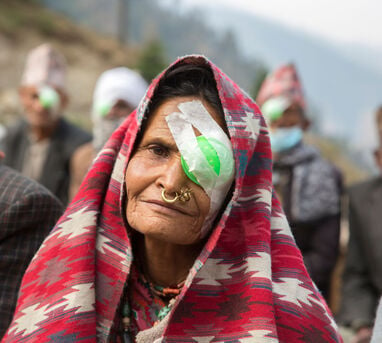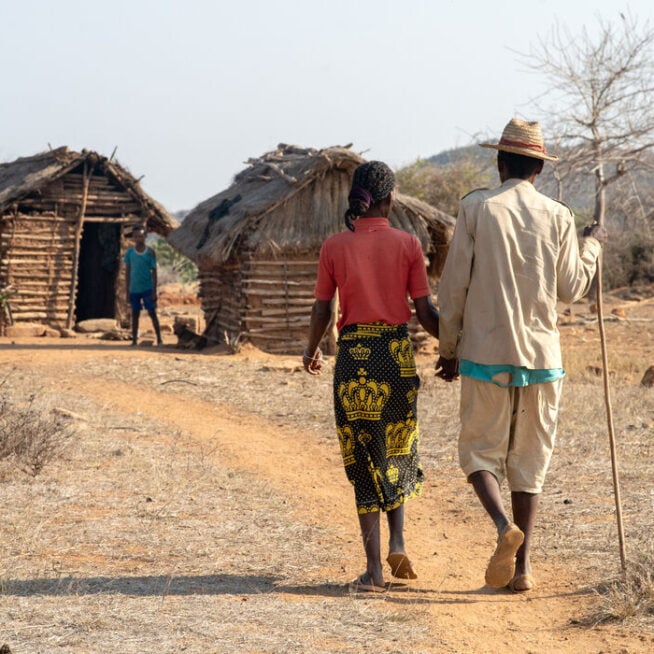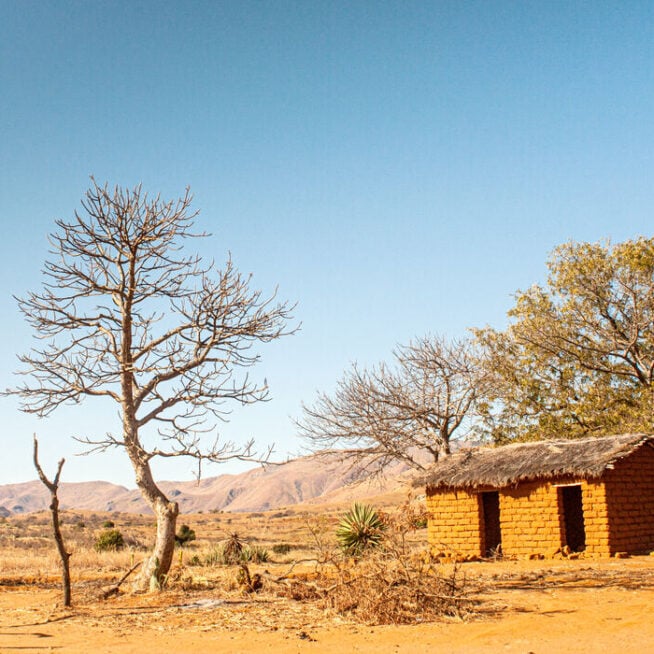A recent discussion with our three Actions for Change partners, in Bangladesh, Kenya and Nepal, reflected on simple, practical and effective approaches for grassroots disability inclusion. Actions for Change is our exciting partner-led programme, testing new ways of shifting resources and decision-making power to our partners. All three organisations are highly knowledgeable and experienced in working with people with disabilities, and had this advice to give:
How can we build in disability inclusion at grassroots levels?
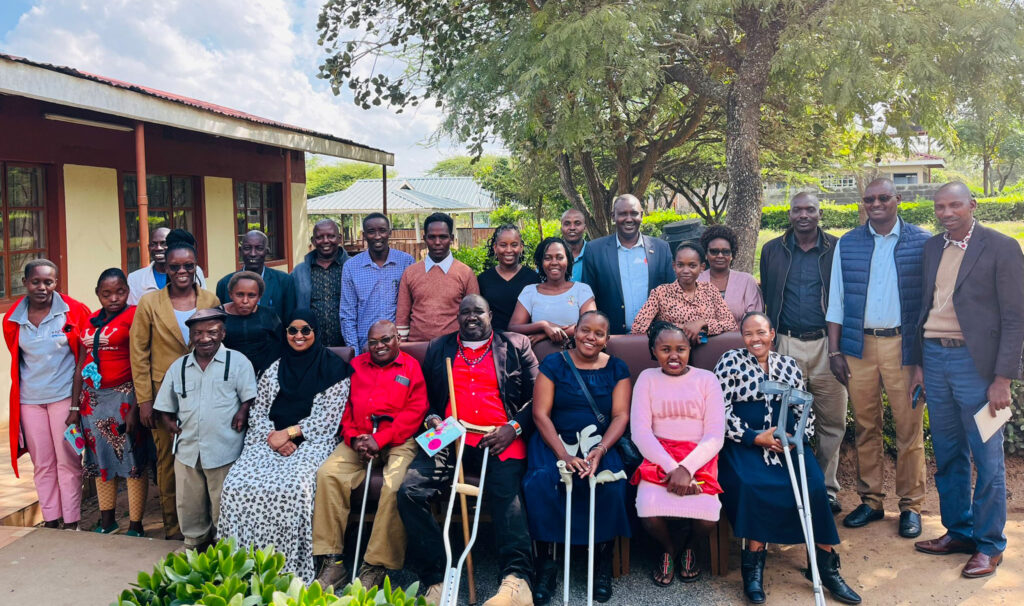
Budget for reasonable accommodation
It is critical to budget for accessibility and reasonable accommodation to ensure that Organisations of People with Disabilities (OPDs) and advocates can be meaningfully included in activities and discussions. People from under-represented impairment groups, such as intellectual disabilities and deaf-blind people, face additional barriers to participation.
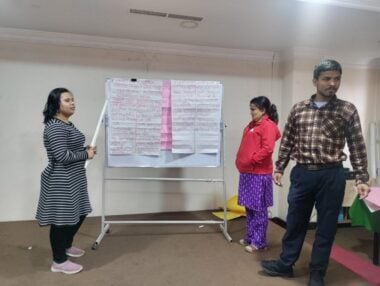
Our partner in Nepal, Blind Youth Association Nepal (BYAN), recently organised a training for 75 peer educators, who are young people with disabilities. The training took place over four days, but an additional preparatory day was taken at the beginning for those with intellectual disabilities. This meeting was organised with help from Parents Federation of People with Intellectual Disabilities, who provided additional support to the trainer to understand how to tailor delivery. During the meeting the facilitator took time to explain to the participants what to expect from the training, as well as to help them in advance to understand key terminology that would be used. This helped them to follow and participate in the main training alongside their peers. A guidebook accompanying the training was produced in multiple accessible formats including Braille, audio and easy-read.
Salina, a peer educator with an intellectual disability, said; “The preparatory meeting boosted my performance because I was already familiar with various topics that would be taught during the four-day training. This knowledge helped me actively engage in group work and presentations, just like the other participants with various disabilities.”
Take purposeful measures to include women
Particular attention must be paid to the inclusion of women with disabilities. Having female staff and volunteers is critical for reaching women, and preference may be given to female candidates for this reason.
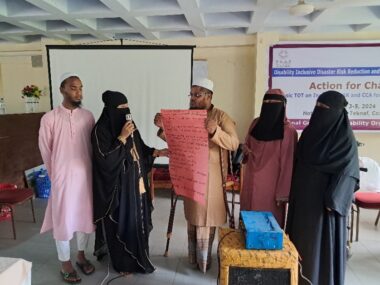
For example, our partner in Bangladesh, National Grassroots Disability Organisation (NGDO), recently organised a training of local OPD members on inclusive Disaster Risk Reduction (DRR). Women in Bangladesh are often not included in such initiatives, due to conservative norms about their mobility outside of the household. This is compounded by disability. NGDO worked with local communities to identify women with disabilities to participate and spent time earning their trust. They took account of the needs of the women, allowing them to be accompanied by a family member, and creating a supportive environment during the training for them to actively contribute.
Half of the training attendees were female and participated actively, including Anjwara, who told us; “I have never imagined that such a training for person with disabilities can be really organised. This is such a heartfelt and memorable experience for me, participating in a training where a majority of the people are person with disabilities.”
Ensure resources are available for core activities
We must recognise that local self-advocates and OPDs have limited access to resources to do their day-to-day work, like talking to people with disabilities in their communities about the barriers they are facing, advocating to local decision makers, and collaborating with development agencies. It is therefore important to resource them to help them carry out this work. This might come in the form of transport costs, communication costs or a stipend. This is particularly important where communities are remote or difficult to get to and from.
In Kenya, disability champions with our partner Northern Nomadic Disabled People’s Organisation (NONDO) have developed their own advocacy action plans, which they are now responsible for implementing. These actions include calling local government, arranging meetings with village leaders and people with disabilities, and attending public participations (consultations organised by government). NONDO gives each champion a small stipend to carry out their work, paid through MPESA (a mobile banking system), which is flexible and can be used to purchase airtime or for transportation.
One of the champions, Emmanuel, said; “I have conducted door-to-door advocacy, raising awareness among persons with disabilities about self-acceptance. This is a struggle that I personally went through, and it requires a support system… The stipend I receive allows me to update NONDO on my advocacy work plan monthly, reach out to community members and attend public participation.”
Similarly, OPDs often have limited access to resources to strengthen their organisations. Funding of development programmes is often accessed primarily by large organisations, while small OPDs rarely see any of these funds. It is important for local OPDs to get opportunities to invest in ways to support themselves to do their critical work of advocacy and supporting their members, such as having a laptop or smartphones, book-keeping skills and resources, transport, a space to work, or income generation opportunities.
Adapt to include multiple languages
Finally, when working at the grassroots, language barriers are a common issue. Local OPD members often do not speak English, or the national language. It is therefore important to engage staff or volunteers from the local communities, whom OPDs can be comfortable interacting with. Translation and interpretation in meetings are important and may need to be budgeted for, and it is essential to adapt processes (such as reports or proposals) so that they can be completed in local language, or alternative formats such as phone calls and verbal reports.
Find out more about Actions for Change here: Actions for Change | CBM UK
Header image: NONDO champions gather for two-day dialogue discussions enhancing understanding of rights, responsibilities, and effective advocacy strategies.
